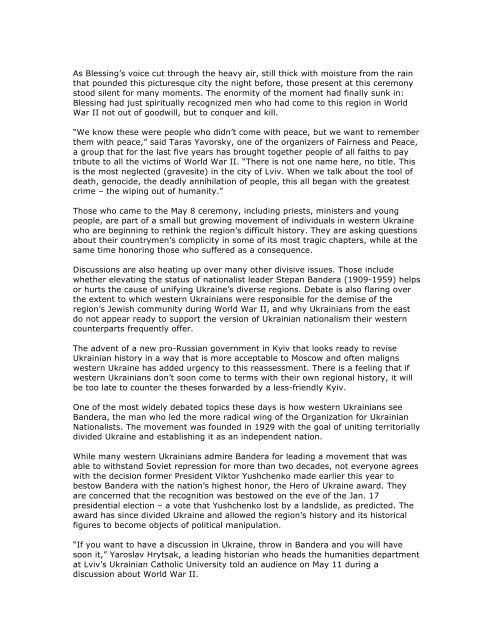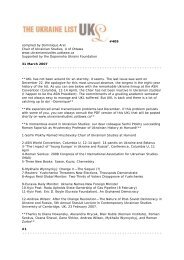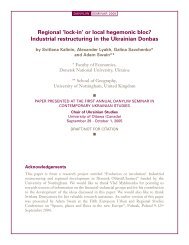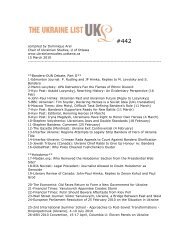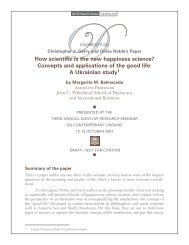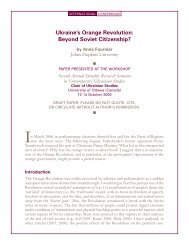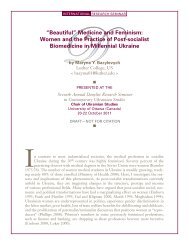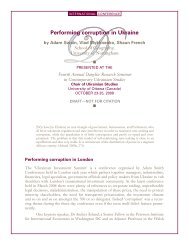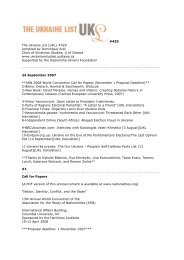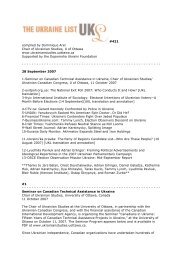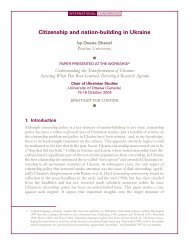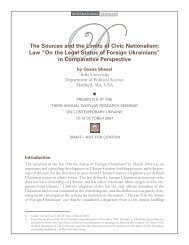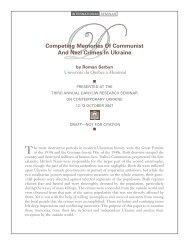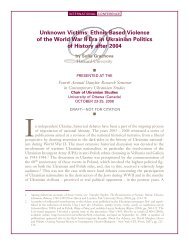UKL444 - Chair of Ukrainian Studies
UKL444 - Chair of Ukrainian Studies
UKL444 - Chair of Ukrainian Studies
Create successful ePaper yourself
Turn your PDF publications into a flip-book with our unique Google optimized e-Paper software.
As Blessing’s voice cut through the heavy air, still thick with moisture from the rain<br />
that pounded this picturesque city the night before, those present at this ceremony<br />
stood silent for many moments. The enormity <strong>of</strong> the moment had finally sunk in:<br />
Blessing had just spiritually recognized men who had come to this region in World<br />
War II not out <strong>of</strong> goodwill, but to conquer and kill.<br />
“We know these were people who didn’t come with peace, but we want to remember<br />
them with peace,” said Taras Yavorsky, one <strong>of</strong> the organizers <strong>of</strong> Fairness and Peace,<br />
a group that for the last five years has brought together people <strong>of</strong> all faiths to pay<br />
tribute to all the victims <strong>of</strong> World War II. “There is not one name here, no title. This<br />
is the most neglected (gravesite) in the city <strong>of</strong> Lviv. When we talk about the tool <strong>of</strong><br />
death, genocide, the deadly annihilation <strong>of</strong> people, this all began with the greatest<br />
crime – the wiping out <strong>of</strong> humanity.”<br />
Those who came to the May 8 ceremony, including priests, ministers and young<br />
people, are part <strong>of</strong> a small but growing movement <strong>of</strong> individuals in western Ukraine<br />
who are beginning to rethink the region’s difficult history. They are asking questions<br />
about their countrymen’s complicity in some <strong>of</strong> its most tragic chapters, while at the<br />
same time honoring those who suffered as a consequence.<br />
Discussions are also heating up over many other divisive issues. Those include<br />
whether elevating the status <strong>of</strong> nationalist leader Stepan Bandera (1909-1959) helps<br />
or hurts the cause <strong>of</strong> unifying Ukraine’s diverse regions. Debate is also flaring over<br />
the extent to which western <strong>Ukrainian</strong>s were responsible for the demise <strong>of</strong> the<br />
region’s Jewish community during World War II, and why <strong>Ukrainian</strong>s from the east<br />
do not appear ready to support the version <strong>of</strong> <strong>Ukrainian</strong> nationalism their western<br />
counterparts frequently <strong>of</strong>fer.<br />
The advent <strong>of</strong> a new pro-Russian government in Kyiv that looks ready to revise<br />
<strong>Ukrainian</strong> history in a way that is more acceptable to Moscow and <strong>of</strong>ten maligns<br />
western Ukraine has added urgency to this reassessment. There is a feeling that if<br />
western <strong>Ukrainian</strong>s don’t soon come to terms with their own regional history, it will<br />
be too late to counter the theses forwarded by a less-friendly Kyiv.<br />
One <strong>of</strong> the most widely debated topics these days is how western <strong>Ukrainian</strong>s see<br />
Bandera, the man who led the more radical wing <strong>of</strong> the Organization for <strong>Ukrainian</strong><br />
Nationalists. The movement was founded in 1929 with the goal <strong>of</strong> uniting territorially<br />
divided Ukraine and establishing it as an independent nation.<br />
While many western <strong>Ukrainian</strong>s admire Bandera for leading a movement that was<br />
able to withstand Soviet repression for more than two decades, not everyone agrees<br />
with the decision former President Viktor Yushchenko made earlier this year to<br />
bestow Bandera with the nation’s highest honor, the Hero <strong>of</strong> Ukraine award. They<br />
are concerned that the recognition was bestowed on the eve <strong>of</strong> the Jan. 17<br />
presidential election – a vote that Yushchenko lost by a landslide, as predicted. The<br />
award has since divided Ukraine and allowed the region’s history and its historical<br />
figures to become objects <strong>of</strong> political manipulation.<br />
“If you want to have a discussion in Ukraine, throw in Bandera and you will have<br />
soon it,” Yaroslav Hrytsak, a leading historian who heads the humanities department<br />
at Lviv’s <strong>Ukrainian</strong> Catholic University told an audience on May 11 during a<br />
discussion about World War II.


